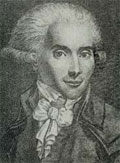 |
Marguerite-Élie Guadet
b. 20 Jul 1755, Saint-Émilion, Gironde [1]
d. 19 Jun 1794, Bordeaux [2] |
| Title: |
Président de la Convention nationale (President of the National Convention) |
| Term: |
18 Oct 1792 - 1 Nov 1792 |
| Chronology: |
18 Oct 1792,
elected, session of the Convention, Salle du Manège, Paris [3] |
|
19 Oct 1792,
assumed the chair, session of the Convention, Salle du Manège, Paris [3] |
|
1 Nov 1792,
ceased to exercise the functions of office upon the election of a successor [4] |
| |
Baptised: Élie (original spelling: Élies) Guadet (20 Jul 1755, Saint-Émilion, Paroisse Saint-Pierre) |
| Other offices: |
Président de l'Assemblée nationale (President of the National Assembly) (22 Jan 1792 - 5 Feb 1792) [see details] |
| Biography: |
| Born in the family of a Bordeaux magistrate; brought up at home until the age of 15; the widow of a rich merchant in Bordeaux paid for his education at the collège of Guyenne; he eventually inherited 20,000 livres from that same widow, and went on to study law in Bordeaux; left for Paris in the mid-1770's, where he worked as personal secretary to Élie de Beaumont, lawyer and friend of Voltaire; returned to Bordeaux (1781) to take up a position as avocat au Parlement; was among the founders of the Jacobin club in Bordeaux; was elected (1790) a member of the administration of the département of Gironde; elected (28 Mar 1791) president of the Criminal Tribunal of the Gironde; elected (1 Sep 1791) as a representative of the Gironde to the Assemblée nationale (National Assembly) (1791-1792); was a member of the Society of the Friends of Blacks, and criticised French plantation owners in Saint-Domingue; joined the Jacobin Club in Paris; was a prominent leader of the Girondin faction and an acerbic speaker, who had several barbed exchanges with Maximilien Robespierre; served as Vice President (10 Jan 1792 - 22 Jan 1792) and President (22 Jan 1792 - 5 Feb 1792) of the National Assembly; was instrumental in forcing King Louis XVI to appoint the first Girondin ministry (March 1792); was among the first deputies to condemn Jean-Paul Marat (1792); appointed a member of the Commission extraordinaire des Douze (Extraordinary Commission of Twelve) (18 Jun 1792 - 21 Sep 1792); remained a royalist and supporter of constitutional monarchy; was elected to the Convention nationale (National Convention) (1792-1794) as a deputy for Gironde; served as President of the National Convention (18 Oct 1792 - 1 Nov 1792); voted for an appeal to the people and for the death sentence in the trial of Louis XVI; as a result of the Jacobin coup, he was put on the list of 29 Girondin deputies subject to arrest (2 Jun 1792); fled from Paris to Caen, and then on to Brittany; was eventually captured in his father's house at Saint-Émilion, Gironde (17 Jun 1794); executed at Bordeaux (19 Jun 1794). |
| Biographical sources: Dictionnaire des parlementaires français 1789-1889, 3:267-268;
Dictionnaire des Conventionnels, 312-314; "La proscription des Girondins (1793-1795)", by Claude Perroud (Paris: F. Alcan, 1917); "Les Girondins: leur vie privée, leur vie publique, leur proscription et leur mort", by Joseph Guadet (Paris: Didier et Cie, 1861). |
| Elections: |
| Candidate |
Vote (18 Oct 1792) |
| 1st ballot |
2nd ballot |
| Marguerite-Élie Guadet |
218 |
336 |
| Georges-Jacques Danton |
207 |
- |
| absolute majority |
234 |
210 |
| voters |
466 |
418 |
|
| Source of electoral results: Archives parlementaires - Série 1, 52:568.
|
| |
| [1] |
Baptismal record was published in "Charlotte de Corday et les Girondins: pièces classées et annotées", ed. by Charles Vatel (Paris: Henri Plon, 1864-1872), 2:189; original record is preserved in the Archives of the Gironde département, 1 Mi EC 88-R4 (online 57/206). The only given name registered at baptism was Élie (spelled Élies). His marriage contract dated 15 Dec 1781 also refers to him as Elie Guadet. |
| [2] |
"La proscription des Girondins", op. cit., 197. |
| [3] |
Archives parlementaires - Série 1, 52:568. |
| [4] |
Archives parlementaires - Série 1, 53:108. |

